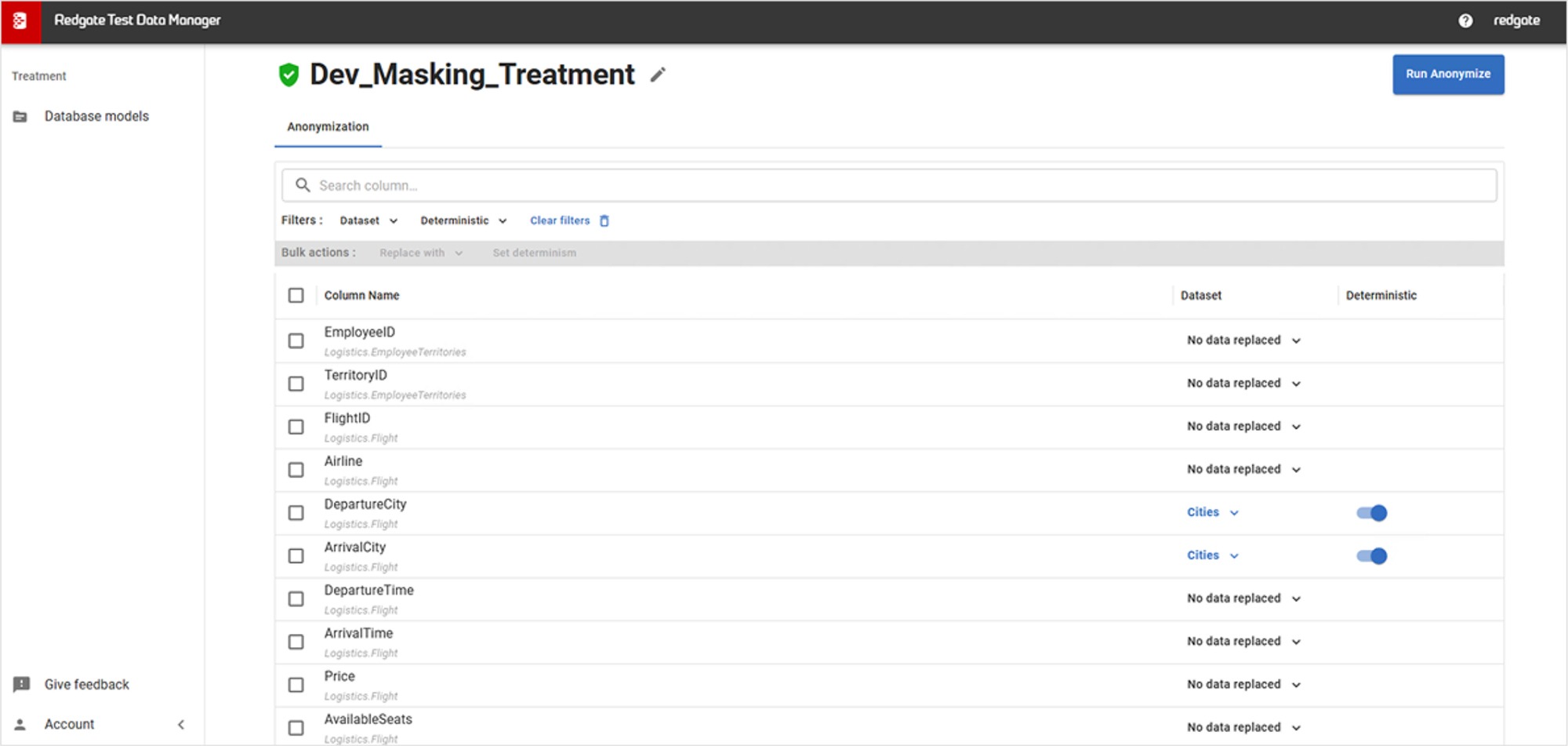Redgate Test Data Manager
Update solution on May 29, 2025

What is it?
Redgate Test Data Manager builds on Redgate’s other test data products to provide a solution for test data management and provisioning that is comprehensive, compatible, and easy to use. Its aim is to provide a complete, reliable, centralised, and straightforward test data creation and provisioning experience that can sit within your existing DevOps pipeline. To this end, it offers automated sensitive data discovery, data masking, data subsetting, database cloning/virtualisation, and more. These capabilities are accessible via both graphical and command line interfaces, providing a simplified user experience with the former, and more advanced functionality – plus integration with existing (CI/CD) pipelines and workflows – with the latter. APIs are available to further enable said integration. It supports containerised workflows, and itself leverages Kubernetes under the hood.
The product is available in two versions: the standard tier consists only of its data discovery, masking, and subsetting functionality, while its enterprise tier offers everything mentioned above. While the latter’s appeal is obvious, the former is designed as a simple and straightforward test data management experience that is particularly well-suited as a starting point for engaging with the space. In either case, the product is compatible with SQLServer, MySQL, PostgreSQL, and Oracle. Other Redgate products, such as Data Masker and SQL Data Catalog, can also be deployed alongside Redgate Test Data Manager, albeit with a more restricted set of supported databases in most cases.
Customer Quotes
“[Redgate] has increased the automation of the release process, and fully supports our agile approach. This means that we can deliver better software, faster.”
Santam
“We want to get new features in our customer’s hands. Now we can do twice the amount of testing, lowering the time to market.”
Surgical Information Systems
“We have been able to provide agile development environments with truly representative copies of the production database without compromising privacy.”
Lagun Aro
Mutable Award: Gold 2025
What does it do?
In both its standard and enterprise versions, Redgate Test Data Manager enables you to create test data subsets of your existing data sets. Data discovery and masking functionality is provided to assist with this. To start with, the product will analyse your database and create a model of it (similar to a schema), using its discovery capabilities to classify your data, and particularly your sensitive data, by examining column names, data types, and data lengths. Once you have your model, you can then create one or more “treatments” of it that determine the specifics of the subsetting and/or masking processes that will be applied to it. Treatments can be created and run directly through the user interface or configured manually via JSON files which are executed through the command line. You can also export an existing treatment as a JSON file and modify it further from there.
Masking in Redgate Test Data Manager replaces sensitive data with a value taken from a specified, predefined data set. This can be done consistently and deterministically (thus retaining referential integrity, primary/foreign key relations, and so on) or not, as you prefer. A selection of data sets is available out of the box for this purpose, and you can create your own by either providing a list of data or by specifying a simple pattern to generate data from. Masking treatments (as seen in Figure 1) allow you to configure which fields should be masked, from which data set the masked value should be pulled, and whether the masking should be deterministic or nondeterministic.

Subsetting treatments allow you to specify the desired size of your subset, and the subsequent subsetting process will match that size as closely as possible while retaining referential integrity. Unlike masking, the full range of subsetting options provided by Redgate Test Data Manager is not (currently) available through the product’s user interface, with additional options only available by directly manipulating JSON treatment files. The options provided this way include filtering, including or excluding specific tables in their entirety, and manually defining relationships in order to preserve their referential integrity (when, for instance, they are present at the application level but not the database level).
The product’s virtualisation capability (only available at the enterprise tier) allows you to create images of your production databases, then generate virtualised clones of those images that can be quickly and easily distributed to your testers via self-service. This functionality is provided by an advancement of the company’s SQL Clone product to include compatibility with the same databases that Redgate Test Data Manager supports, as well as additional functionality such as instance-level clones and support for containerised workflows.
Images are complete point-in-time copies of a database taken from a backup. They are stored centrally, may contain multiple databases, and can be subsetted and masked during the image creation process. Clones are derived from an image and store the differences between themselves and the image they were derived from. Due to this, they are small in size, and can be created quickly, wherever they are needed. This means that your testers can connect to a masked clone from their local machine whenever they need test data, without having to wait on either an administrator or a lengthy provisioning process. At the same time, the administrative overhead for test data environments is substantially reduced, because they only contain a relatively small number of data assets (images) that need to be managed manually. In addition, clones created from the same image are identical in terms of their internal specifications, what database version they are running, and so on, adding an additional measure of standardisation and uniformity to your testing procedures.
The product also features ephemeral servers that can be spun up and down rapidly, as needed, and en masse.
Why should you care?
Redgate Test Data Manager provides a test data management solution built around creating and distributing database clones while also offering highly automated data subsetting, data masking, and sensitive data discovery. This offers significant advantages in and of itself: for example, leveraging database cloning effectively guarantees that your test data will be representative, discovery and masking help to ensure compliance, and the automated nature of these features can work to accelerate your test data processes.
In addition, using all of these features is easy due to the simplified approach employed within the product’s user interface, making both test data creation and distribution fast and straightforward, while access to self-service test data makes life easier for your developers, testers, and DBAs alike. At the same time, more advanced functionality is available for those who want or need it via the command line interface, as is integration with existing tools and into existing pipelines and processes. This approach is exemplified by the product’s recent split into standard and enterprise tiers, with the former simplified even further by the removal of functionality that will frequently not be fit-for-purpose for newcomers to test data management.
The bottom line
Redgate Test Data Manager is an effective test data management solution built around database cloning (or virtualisation, if you prefer). While we would not say its database support is extensive, it is significantly broader than its predecessor products, and will be more than enough for many organisations. On top of that, the product’s commitment to ease of use (while still providing advanced functionality, albeit through configuration files) is compelling. In short, if Redgate Test Data Manager is an option for your environment, you should be considering it.
Related Company
Connect with Us
Ready to Get Started
Learn how Bloor Research can support your organization’s journey toward a smarter, more secure future."
Connect with us Join Our Community
